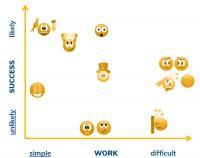
“For reactivating vacant buildings it could be useful to identify owners types in order to adjust your approach.” (Kristijan Radojcic, 02 December 2019)
Since the beginning of the project (Agentur StadtWohnen/Housing Agency Chemnitz) we have had countless contacts with owners of vacant and decaying buildings. In our efforts to activate these owners, to refurbish their buildings or to sell them to interested parties willing and able to renovate, we got to know the most different types of owners and people. Depending on the type, different approaches proved to be successful. Or not.
We developed a typology of owner types in order to better adapt our activities to each owner. We also recognized that certain types could not be reached by us despite all efforts.
For all those who also need to establish contacts with house-owners or other actors that are important for urban development - our typology as a (subjective) categorisation from the experiences of the agency.
Of course there are also some overlaps in the types of owners. Ms. Projectmaker may become overwhelmed in the course of the project. And the Non-Completer can also turn into a do-it-yourselfer. A do-it-yourselfer can also turn out to be a speculator.
And of course this list is not complete and not a scientific or conclusive catalogue of “characters” - other cities will have other owner types. This list is a suggestion to evaluate the owners with whom you have contact. The assessment should help to plan the way in which contact will be maintained and how much effort is likely to be required.
Depending on the legal framework, municipal authorities have other possibilities than agencies to influence inactive owners. The methods can be combined. A carrot and stick combination would also be possible and has already shown its merits in Chemnitz.
The positioning in the chart below shows the amount of work needed to reach the agency’s goals and the likeliness to reach a success or positive results. Some owner types sug-gest rather easy and quick results (which, however, may have happened anyways). In other cases – often the challenging ones – they are more difficult but are unlikely to have happened without the agency’s intervention (the agency’s real successes).



